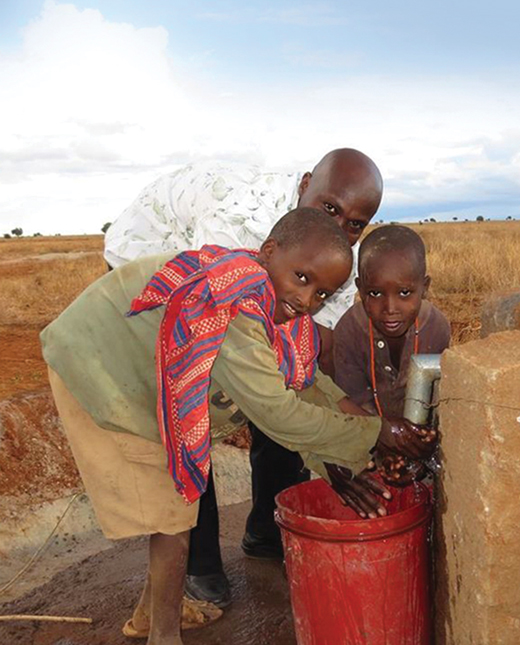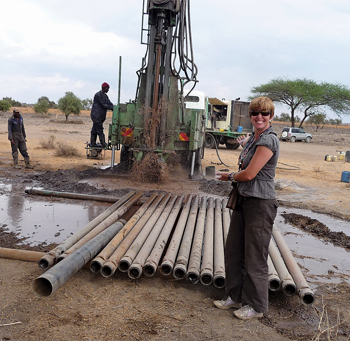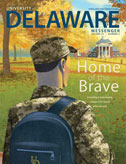
Where water is life
by Eric Ruth, AS93
OUR UD | The families of the Maasai tribe in Kenya now enjoy access to fresh, clean water thanks to the efforts of many UD community members.
Imagine living in a place where parents don’t bother to name their babies, because chances are the child may soon be buried.
Imagine having to walk six to eight hours every day just to fetch and haul the water your family needs to survive.
Put yourself in the world of the Maasai people of south-central Kenya, where inhospitable geography and too-frequent droughts make water a precious commodity, and where the brightest gleams of hope arrive from 7,460 miles away—from Newark, Delaware.

For 10 years now, a committed core of UD professors, students, alumni and local residents have joined in a mission to make water a less-elusive commodity for the Maasai, ceaselessly raising money to dig wells in the hard-packed landscape and working with the local tribespeople to make meaningful change.
In that decade, Water is Life Kenya (WILK) has completed 15 major water projects, giving 45,000 people access to fresh water. More than 300 residents have been trained in better livestock management techniques, and a loan program has allowed them to build up their herds. At UD, a registered student organization around WILK is currently in place, and partnerships with other departments and programs are underway.
Now, the tribe’s babies are living, and learning, without the daily struggle of dehydration dominating their existence, says Joyce Tannian, the Newark woman who leads the outreach effort and sustains it as a full-time passion. “Women have the time to start their own businesses now,” making bead jewelry that is sold online, adds Colleen Leithren, AS82, EHD15M, U.S. program director.
It all started when Tannian approached her father one Christmas with a plea to help the tribespeople she had met as a volunteer in Kenya. Heeding Christ’s call to help his fellow man, UD economics Prof. Emeritus Francis X. Tannian gave all the money he could—and gives still.
Soon, Joyce would leave her job as assistant to the president of HBO, put aside her passion of opera singing and devote herself to the cause full-time. “That’s the secret sauce—Joyce’s work and time in Kenya,” Francis Tannian says.
For Joyce and the team, this is about so much more than digging holes. The group devotes considerable resources to teaching the Maasai the skills needed to manage these long-term projects themselves. “We don’t want to culturally change things, but it requires accountable leadership,” says Joyce, who is called “Mama Maji” by the Maasai, meaning “Water Lady.” “We want them to become change agents in their communities.”
Much of the year, Joyce is in Kenya, managing operations with a team based there. Frequently, she is accompanied by WILK members from Newark, who invariably leave aghast at the conditions they see and the corruption they encounter.
“I have been around the world, and I have never seen poverty at the level I saw there,” says Mark Manniso, AS84, who lets WILK’s Delaware operations share part of his marketing firm’s office space.
It’s also a nation that can stand at the brink of political chaos at times. For hundreds of years, access to the springwaters around Kilimanjaro sustained the Maasai, until the government forced about 30,000 of them to relocate so that a national park could be created in 1970.
“They took them out of the key water spot, because the tourists who are paying a hundred dollars a day don’t want to see sheep and goats, they want to see lions,” says Tad Yancheski, EOE83, 85M, a former adjunct environmental science professor at UD and current WILK member.
Even after 10 years, the need in Kenya can seem endless, but Joyce and her team fight on. “No matter where we are in that area, people are seeking her out. They want to know, ‘When are you going to help with my project?’” Yancheski says.
“But she doesn’t have the resources to say yes to all of them,” says Yolanda Chetwynd, who has worked since the beginning to support WILK with husband, Suresh Advani, chair of UD’s Department of Mechanical Engineering.
“She’s amazing,” Chetwynd adds. “It’s her passion that inspires all of us to act.”




